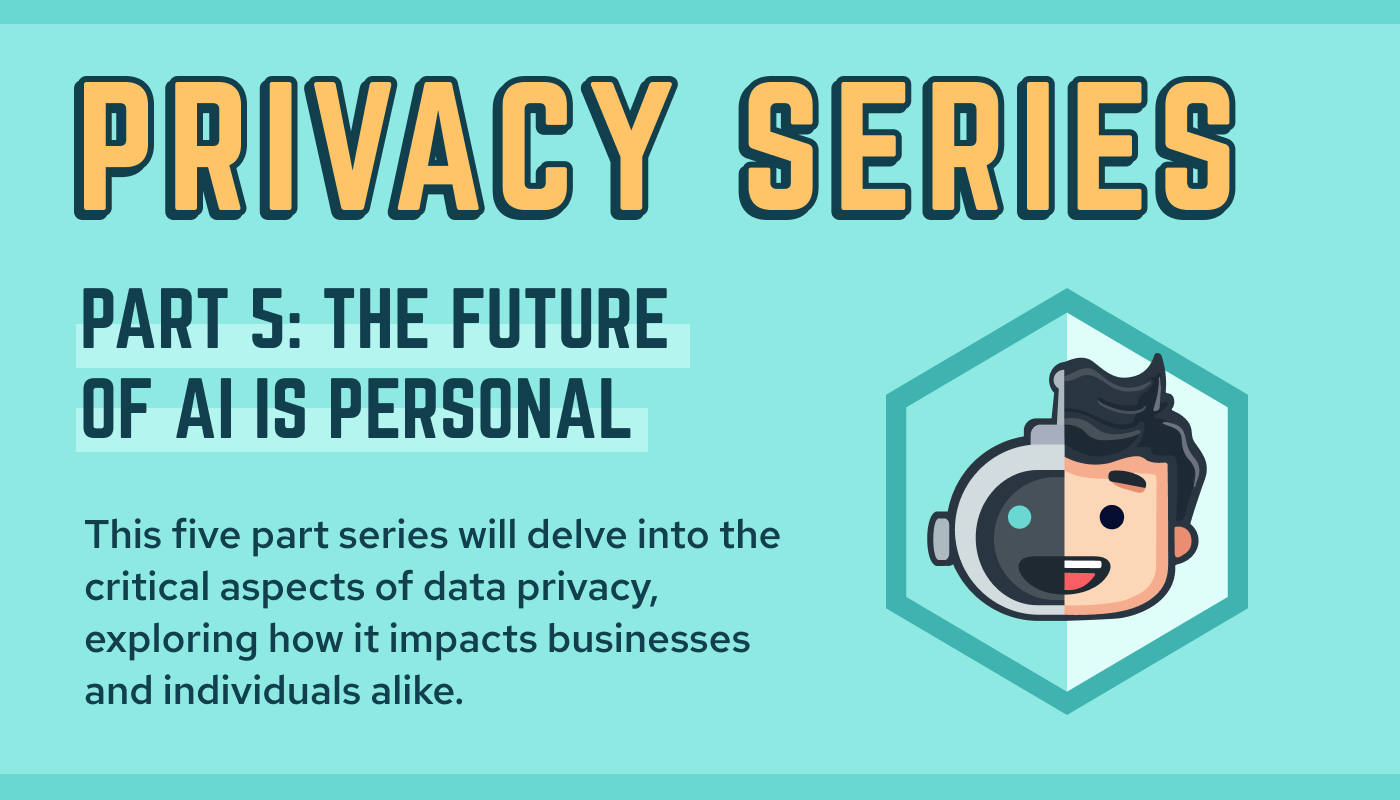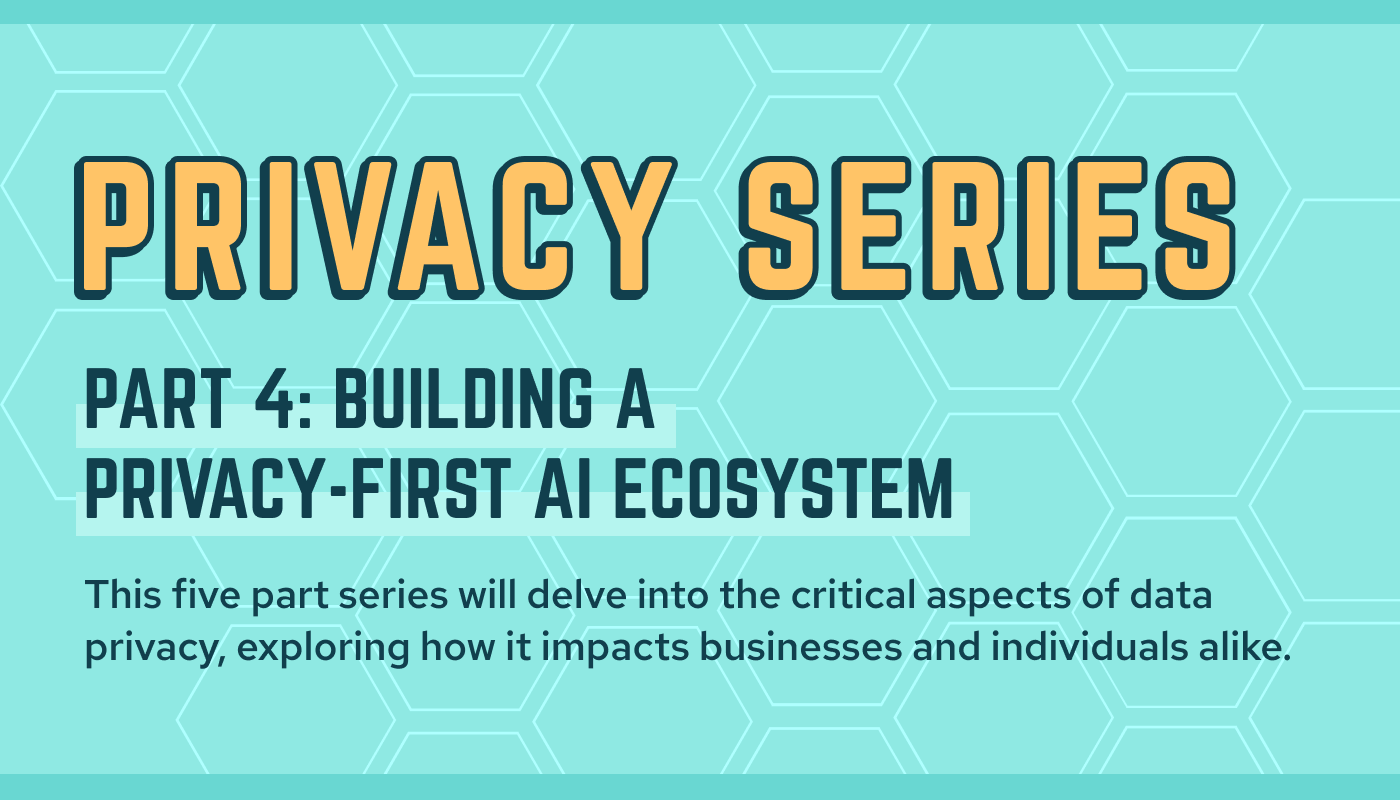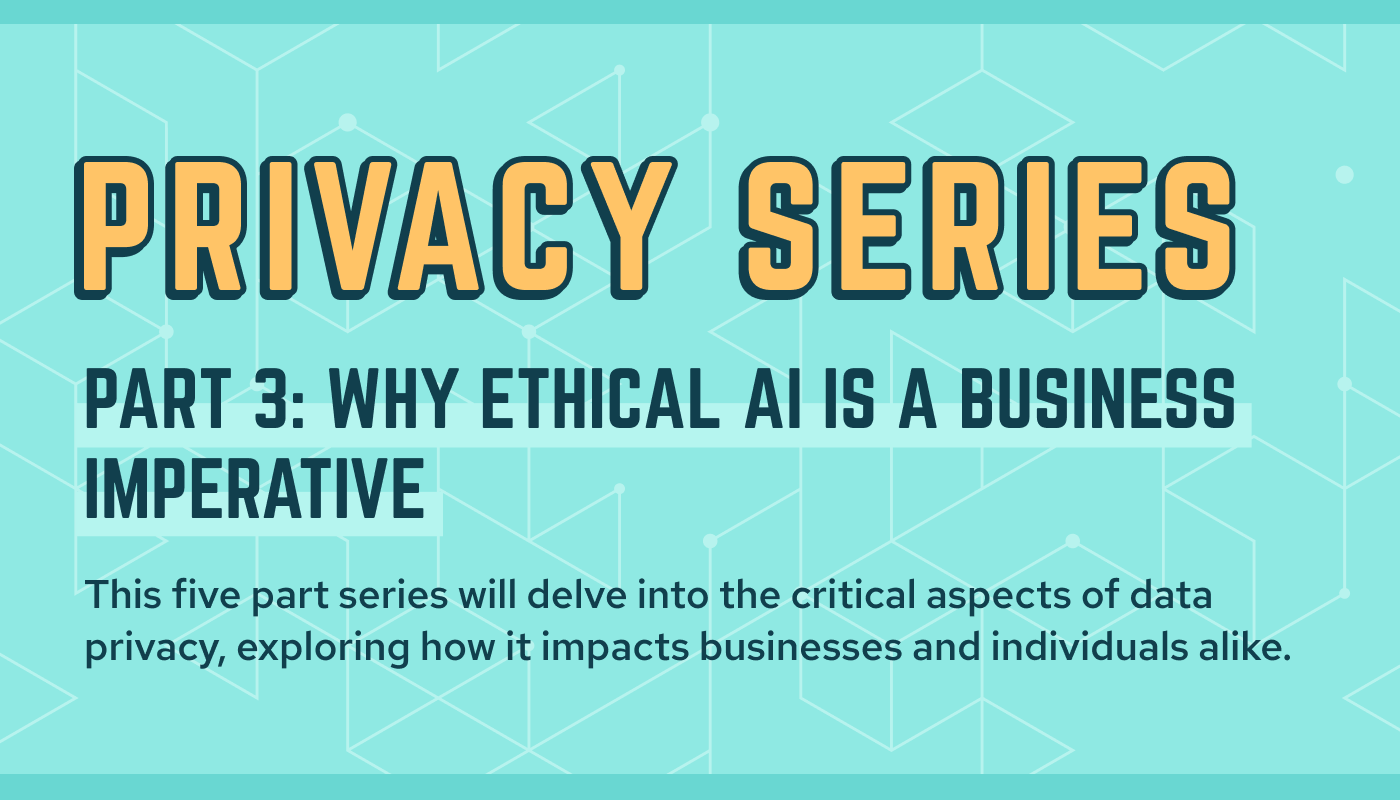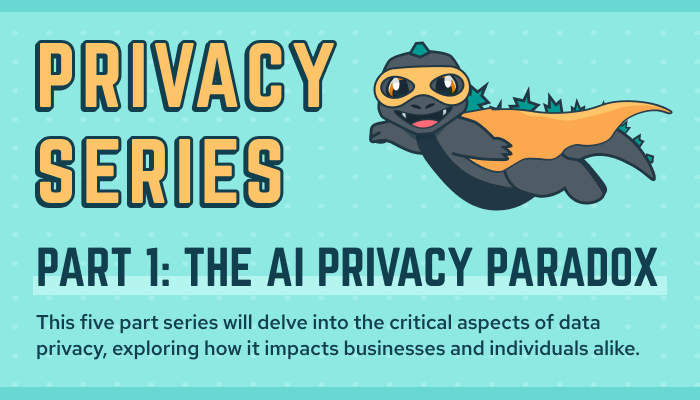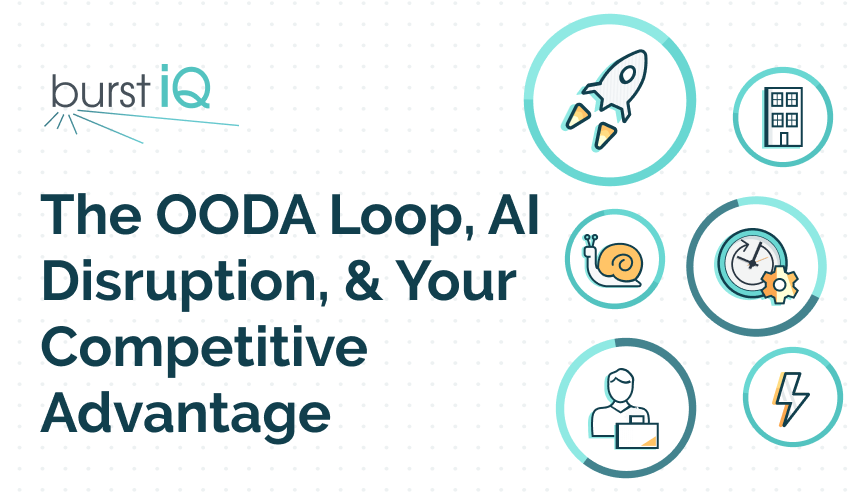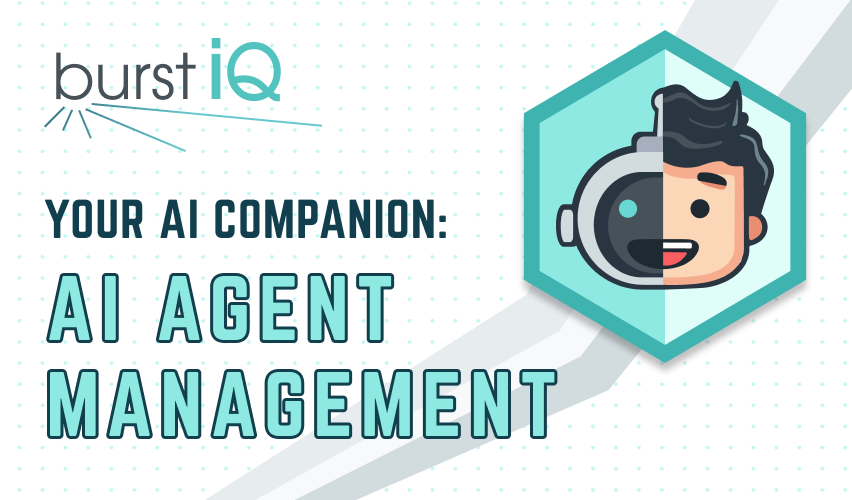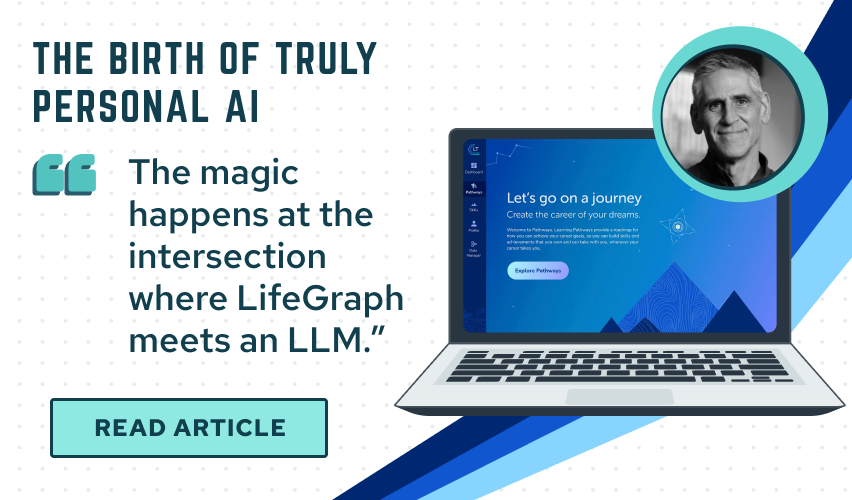
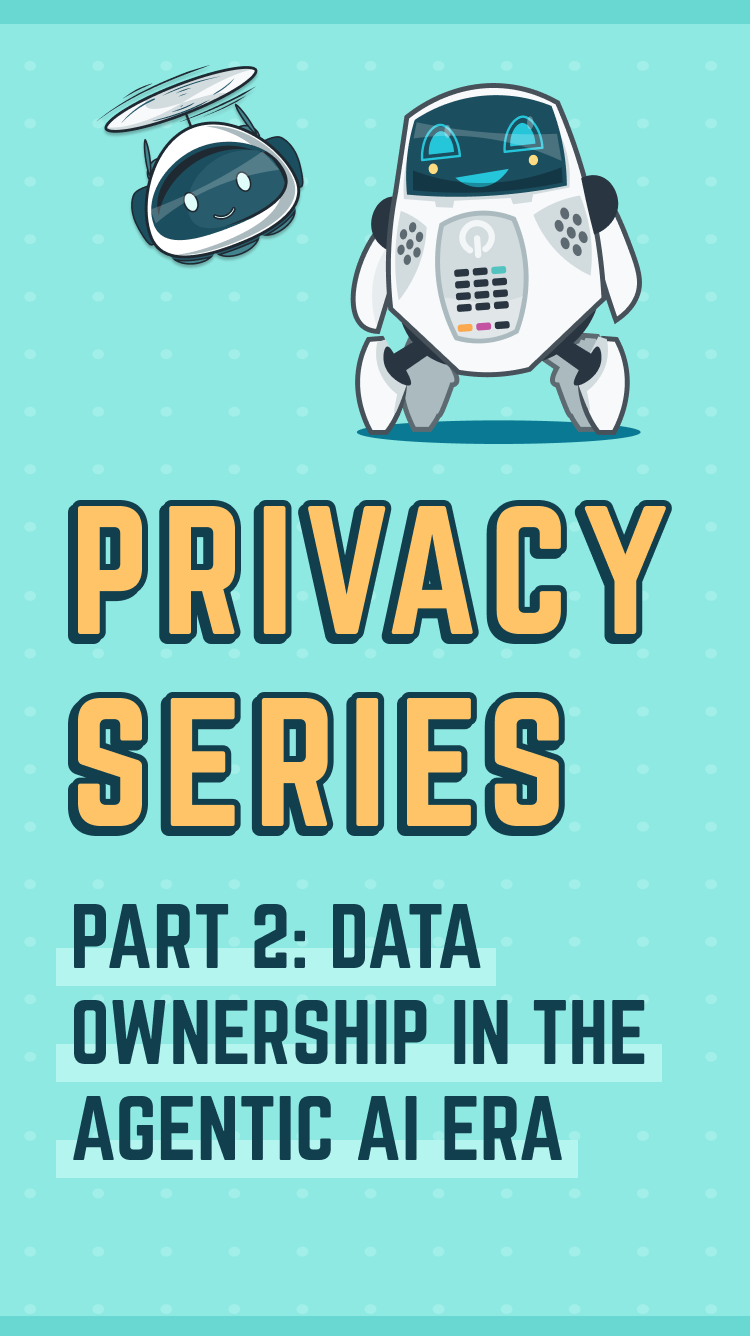
Data Ownership in the Agentic AI Era:
What Enterprise Leaders Need to Know
For years, enterprises have operated under a familiar paradigm: businesses collect, store, and control customer data in exchange for delivering personalized products and services. But in the age of agentic AI, this model is rapidly becoming obsolete. Customers are no longer satisfied with being passive participants in a system where their data is commoditized. They’re demanding more transparency, autonomy, and control over their data use.
This shift presents both challenges and opportunities for C-level executives in regulated industries. Those who adapt to this new era of data ownership will not only meet rising customer expectations but also position their businesses as leaders in the trust economy.
Are you prepared to give your customers the keys to their digital identities?
Agentic AI & the Shift to Data Ownership
At its core, agentic AI refers to personal, autonomous AI systems capable of acting on behalf of individuals. Unlike traditional AI systems that serve enterprises, agentic AI prioritizes the individual, empowering them to take control of their interactions with businesses and technology.
This shift is forcing enterprises to rethink the way they handle customer data. In the past, businesses operated under the assumption that they “owned” customer data once it was collected. However, as agentic AI becomes mainstream, customers are reclaiming ownership of their data and demanding systems that reflect their autonomy.
This shift represents a profound change in how value is created and delivered for executives.
TRUST INSIGHT: Companies that succeed in the agentic AI era will prioritize data ownership and trust, not as compliance-driven afterthoughts but as core business strategies.
The Consequences of Clinging to Old Models
Enterprises that fail to adapt to the agentic AI revolution risk falling behind in three critical ways:
- Eroding Customer Trust:
Customers increasingly know how their data is being used and misused. They’re no longer willing to give companies the benefit of the doubt. Businesses that continue to operate opaque, centralized data systems will struggle to maintain trust in a world where transparency is non-negotiable.
Example: Companies like Facebook and Google have faced mounting backlash for exploiting user data without clear consent. Customers are no longer willing to tolerate “black box” systems that prioritize profits over privacy.
- Regulatory Vulnerabilities:
Governments worldwide are responding to the data ownership movement with stricter regulations. Laws like GDPR (Europe), CCPA (California), and HIPAA (U.S. healthcare) are just the beginning. Enterprises that fail to comply with these regulations, as well as future AI regulations, will face fines, reputational damage, and operational setbacks.
- Losing the Competitive Edge:
Forward-thinking companies are already embracing data ownership as a competitive advantage. By empowering customers to control their data, these businesses are building deeper, more loyal relationship and attracting new customers who value trust and transparency.
Example: Apple’s privacy-first approach is a prime example of how companies can differentiate themselves by aligning with customer values. By positioning privacy as a core feature (e.g., App Tracking Transparency), Apple has built trust while reinforcing its competitive edge in the market.
TRUST INSIGHT: Non-compliance isn’t just an operational risk, it is a direct hit to the bottom line. In July 2024, a faulty CrowdStrike update caused widespread Windows system crashes, revealing compliance gaps and risking up to $46 million in fines, regulatory actions, and loss of operating authorization—turning a technical outage into a major crisis with lasting consequences. (Source)
Why Data Ownership is a Business Imperative
Here’s why empowering customers to own their data is a strategic must for anyone who wants to be competitive over the next 5-10 years:
- Better Data, Better AI:
When customers trust that their data is being used responsibly, they’re more willing to share it. This creates a virtuous cycle: customers provide more accurate, high-quality data, which leads to better AI insights and more personalized, meaningful experiences.
- Stronger Customer Relationships:
Empowering customers with control over their data demonstrates that your business values their autonomy and trust. This builds loyalty and fosters long-term relationships, critical factors for success in regulated industries where customer retention is key.
- Futureproofing Against Regulation:
By proactively embracing data ownership, enterprises can stay ahead of regulatory requirements and position themselves as leaders in privacy-first innovation. This reduces compliance risks and ensures resilience in an ever-changing regulatory landscape.
TRUST INSIGHT: Shifting to a data ownership model is about more than avoiding risk; it’s about unlocking new opportunities.
How to Embrace Data Ownership in the Age of Agentic AI
For C-level executives, adapting to the agentic AI era requires a strategic shift in how data is managed, shared, and protected.
Here are three actionable steps to get started:
1. Adopt User-Centric Data Models: Move away from centralized data systems and embrace platforms that prioritize user ownership and control. Decentralized systems, like BurstIQ’s LifeGraph, enable customers to own and manage their data while still allowing enterprises to leverage AI insights securely and ethically.
TRUST INSIGHT: The AI privacy paradox isn’t a barrier, it’s an opportunity. Enterprises that solve this puzzle will unlock the full potential of AI while setting themselves apart in a competitive market.
2. Design for Transparency:
Make transparency a core principle of your AI strategy. This means giving customers clear, accessible information about how their data is being used and ensuring they can opt in, opt out, or take their data elsewhere.
TRUST INSIGHT: Transparency isn’t just about compliance, it’s about building trust in an increasingly skeptical world.
3. Invest in Privacy-First Technology:
Leverage technologies that prioritize privacy and security, such as encryption, anonymization, and blockchain. These tools protect customer data and demonstrate your commitment to ethical AI practices.
TRUST INSIGHT: Privacy-first technology isn’t a cost, it’s an investment in your business’s long-term success.
BurstIQ’s Approach: Empowering Data Ownership with LifeGraph
At BurstIQ, we’re redefining what data ownership means in the age of agentic AI. The LifeGraph® platform empowers individuals to take control of their data while enabling enterprises to build trusted, meaningful relationships with their customers.
By decentralizing data ownership and prioritizing transparency, LifeGraph bridges the gap between businesses and individuals, creating a future where AI is both personal and trustworthy.
Final Thought: The Future Belongs to the Trusted
The shift to data ownership isn’t just a trend, it’s a fundamental transformation in how enterprises interact with customers in the digital age. For C-level executives, this is a moment of opportunity. Those who embrace data ownership, align with customer values, and adapt to the agentic AI revolution will build trust, drive innovation, and thrive in regulated industries.
The question is:What’s your strategy for making it a competitive advantage?
If you missed part 1 of our five-part series on data privacy, check it out here. Stay tuned as we delve into the critical aspects of data privacy, exploring how it impacts businesses and individuals alike.
To stay updated and ensure you don’t miss any of the upcoming articles, be sure to follow us on LinkedIn. Join us on this journey as we navigate the complexities of data privacy together!
Data Ownership in the Agentic AI Era:
What Enterprise Leaders Need to Know
For years, enterprises have operated under a familiar paradigm: businesses collect, store, and control customer data in exchange for delivering personalized products and services. But in the age of agentic AI, this model is rapidly becoming obsolete. Customers are no longer satisfied with being passive participants in a system where their data is commoditized. They’re demanding more transparency, autonomy, and control over their data use.
This shift presents both challenges and opportunities for C-level executives in regulated industries. Those who adapt to this new era of data ownership will not only meet rising customer expectations but also position their businesses as leaders in the trust economy.
Are you prepared to give your customers the keys to their digital identities?
Agentic AI & the Shift to Data Ownership
At its core, agentic AI refers to personal, autonomous AI systems capable of acting on behalf of individuals. Unlike traditional AI systems that serve enterprises, agentic AI prioritizes the individual, empowering them to take control of their interactions with businesses and technology.
This shift is forcing enterprises to rethink the way they handle customer data. In the past, businesses operated under the assumption that they “owned” customer data once it was collected. However, as agentic AI becomes mainstream, customers are reclaiming ownership of their data and demanding systems that reflect their autonomy.
This shift represents a profound change in how value is created and delivered for executives.
TRUST INSIGHT: Companies that succeed in the agentic AI era will prioritize data ownership and trust, not as compliance-driven afterthoughts but as core business strategies.
The Consequences of Clinging to Old Models
Enterprises that fail to adapt to the agentic AI revolution risk falling behind in three critical ways:
- Eroding Customer Trust:
Customers increasingly know how their data is being used and misused. They’re no longer willing to give companies the benefit of the doubt. Businesses that continue to operate opaque, centralized data systems will struggle to maintain trust in a world where transparency is non-negotiable.
Example: Companies like Facebook and Google have faced mounting backlash for exploiting user data without clear consent. Customers are no longer willing to tolerate “black box” systems that prioritize profits over privacy.
- Regulatory Vulnerabilities:
Governments worldwide are responding to the data ownership movement with stricter regulations. Laws like GDPR (Europe), CCPA (California), and HIPAA (U.S. healthcare) are just the beginning. Enterprises that fail to comply with these regulations, as well as future AI regulations, will face fines, reputational damage, and operational setbacks.
- Losing the Competitive Edge:
Forward-thinking companies are already embracing data ownership as a competitive advantage. By empowering customers to control their data, these businesses are building deeper, more loyal relationship and attracting new customers who value trust and transparency.
Example: Apple’s privacy-first approach is a prime example of how companies can differentiate themselves by aligning with customer values. By positioning privacy as a core feature (e.g., App Tracking Transparency), Apple has built trust while reinforcing its competitive edge in the market.
TRUST INSIGHT: Non-compliance isn’t just an operational risk, it is a direct hit to the bottom line. In July 2024, a faulty CrowdStrike update caused widespread Windows system crashes, revealing compliance gaps and risking up to $46 million in fines, regulatory actions, and loss of operating authorization—turning a technical outage into a major crisis with lasting consequences. (Source)
Why Data Ownership is a Business Imperative
Here’s why empowering customers to own their data is a strategic must for anyone who wants to be competitive over the next 5-10 years:
- Better Data, Better AI:
When customers trust that their data is being used responsibly, they’re more willing to share it. This creates a virtuous cycle: customers provide more accurate, high-quality data, which leads to better AI insights and more personalized, meaningful experiences.
- Stronger Customer Relationships:
Empowering customers with control over their data demonstrates that your business values their autonomy and trust. This builds loyalty and fosters long-term relationships, critical factors for success in regulated industries where customer retention is key.
- Futureproofing Against Regulation:
By proactively embracing data ownership, enterprises can stay ahead of regulatory requirements and position themselves as leaders in privacy-first innovation. This reduces compliance risks and ensures resilience in an ever-changing regulatory landscape.
TRUST INSIGHT: Shifting to a data ownership model is about more than avoiding risk; it’s about unlocking new opportunities.
How to Embrace Data Ownership in the Age of Agentic AI
For C-level executives, adapting to the agentic AI era requires a strategic shift in how data is managed, shared, and protected.
Here are three actionable steps to get started:
1. Adopt User-Centric Data Models: Move away from centralized data systems and embrace platforms that prioritize user ownership and control. Decentralized systems, like BurstIQ’s LifeGraph, enable customers to own and manage their data while still allowing enterprises to leverage AI insights securely and ethically.
TRUST INSIGHT: The AI privacy paradox isn’t a barrier, it’s an opportunity. Enterprises that solve this puzzle will unlock the full potential of AI while setting themselves apart in a competitive market.
2. Design for Transparency:
Make transparency a core principle of your AI strategy. This means giving customers clear, accessible information about how their data is being used and ensuring they can opt in, opt out, or take their data elsewhere.
TRUST INSIGHT: Transparency isn’t just about compliance, it’s about building trust in an increasingly skeptical world.
3. Invest in Privacy-First Technology:
Leverage technologies that prioritize privacy and security, such as encryption, anonymization, and blockchain. These tools protect customer data and demonstrate your commitment to ethical AI practices.
TRUST INSIGHT: Privacy-first technology isn’t a cost, it’s an investment in your business’s long-term success.
BurstIQ’s Approach:
Empowering Data Ownership with LifeGraph
At BurstIQ, we’re redefining what data ownership means in the age of agentic AI. The LifeGraph® platform empowers individuals to take control of their data while enabling enterprises to build trusted, meaningful relationships with their customers.
By decentralizing data ownership and prioritizing transparency, LifeGraph bridges the gap between businesses and individuals, creating a future where AI is both personal and trustworthy.
Final Thought:
The Future Belongs to the Trusted
The shift to data ownership isn’t just a trend, it’s a fundamental transformation in how enterprises interact with customers in the digital age. For C-level executives, this is a moment of opportunity. Those who embrace data ownership, align with customer values, and adapt to the agentic AI revolution will build trust, drive innovation, and thrive in regulated industries.
The question is:What’s your strategy for making it a competitive advantage?
If you missed part 1 of our five-part series on data privacy, check it out here. Stay tuned as we delve into the critical aspects of data privacy, exploring how it impacts businesses and individuals alike.
To stay updated and ensure you don’t miss any of the upcoming articles, be sure to follow us on LinkedIn. Join us on this journey as we navigate the complexities of data privacy together!
Data Ownership in the Agentic AI Era:
What Enterprise Leaders Need to Know
For years, enterprises have operated under a familiar paradigm: businesses collect, store, and control customer data in exchange for delivering personalized products and services. But in the age of agentic AI, this model is rapidly becoming obsolete. Customers are no longer satisfied with being passive participants in a system where their data is commoditized. They’re demanding more transparency, autonomy, and control over their data use.
This shift presents both challenges and opportunities for C-level executives in regulated industries. Those who adapt to this new era of data ownership will not only meet rising customer expectations but also position their businesses as leaders in the trust economy.
Are you prepared to give your customers the keys to their digital identities?
Agentic AI & the Shift to Data Ownership
At its core, agentic AI refers to personal, autonomous AI systems capable of acting on behalf of individuals. Unlike traditional AI systems that serve enterprises, agentic AI prioritizes the individual, empowering them to take control of their interactions with businesses and technology.
This shift is forcing enterprises to rethink the way they handle customer data. In the past, businesses operated under the assumption that they “owned” customer data once it was collected. However, as agentic AI becomes mainstream, customers are reclaiming ownership of their data and demanding systems that reflect their autonomy.
This shift represents a profound change in how value is created and delivered for executives.
TRUST INSIGHT: Companies that succeed in the agentic AI era will prioritize data ownership and trust, not as compliance-driven afterthoughts but as core business strategies.
The Consequences of Clinging to Old Models
Enterprises that fail to adapt to the agentic AI revolution risk falling behind in three critical ways:
- Eroding Customer Trust:
Customers increasingly know how their data is being used and misused. They’re no longer willing to give companies the benefit of the doubt. Businesses that continue to operate opaque, centralized data systems will struggle to maintain trust in a world where transparency is non-negotiable.
Example: Companies like Facebook and Google have faced mounting backlash for exploiting user data without clear consent. Customers are no longer willing to tolerate “black box” systems that prioritize profits over privacy.
- Regulatory Vulnerabilities:
Governments worldwide are responding to the data ownership movement with stricter regulations. Laws like GDPR (Europe), CCPA (California), and HIPAA (U.S. healthcare) are just the beginning. Enterprises that fail to comply with these regulations, as well as future AI regulations, will face fines, reputational damage, and operational setbacks.
- Losing the Competitive Edge:
Forward-thinking companies are already embracing data ownership as a competitive advantage. By empowering customers to control their data, these businesses are building deeper, more loyal relationship and attracting new customers who value trust and transparency.
Example: Apple’s privacy-first approach is a prime example of how companies can differentiate themselves by aligning with customer values. By positioning privacy as a core feature (e.g., App Tracking Transparency), Apple has built trust while reinforcing its competitive edge in the market.
TRUST INSIGHT: Non-compliance isn’t just an operational risk, it is a direct hit to the bottom line. In July 2024, a faulty CrowdStrike update caused widespread Windows system crashes, revealing compliance gaps and risking up to $46 million in fines, regulatory actions, and loss of operating authorization—turning a technical outage into a major crisis with lasting consequences. (Source)
Why Data Ownership is a Business Imperative
Here’s why empowering customers to own their data is a strategic must for anyone who wants to be competitive over the next 5-10 years:
- Better Data, Better AI:
When customers trust that their data is being used responsibly, they’re more willing to share it. This creates a virtuous cycle: customers provide more accurate, high-quality data, which leads to better AI insights and more personalized, meaningful experiences.
- Stronger Customer Relationships:
Empowering customers with control over their data demonstrates that your business values their autonomy and trust. This builds loyalty and fosters long-term relationships, critical factors for success in regulated industries where customer retention is key.
- Futureproofing Against Regulation:
By proactively embracing data ownership, enterprises can stay ahead of regulatory requirements and position themselves as leaders in privacy-first innovation. This reduces compliance risks and ensures resilience in an ever-changing regulatory landscape.
TRUST INSIGHT: Shifting to a data ownership model is about more than avoiding risk; it’s about unlocking new opportunities.
How to Embrace Data Ownership in the Age of Agentic AI
For C-level executives, adapting to the agentic AI era requires a strategic shift in how data is managed, shared, and protected.
Here are three actionable steps to get started:
1. Adopt User-Centric Data Models: Move away from centralized data systems and embrace platforms that prioritize user ownership and control. Decentralized systems, like BurstIQ’s LifeGraph, enable customers to own and manage their data while still allowing enterprises to leverage AI insights securely and ethically.
TRUST INSIGHT: The AI privacy paradox isn’t a barrier, it’s an opportunity. Enterprises that solve this puzzle will unlock the full potential of AI while setting themselves apart in a competitive market.
2. Design for Transparency:
Make transparency a core principle of your AI strategy. This means giving customers clear, accessible information about how their data is being used and ensuring they can opt in, opt out, or take their data elsewhere.
TRUST INSIGHT: Transparency isn’t just about compliance, it’s about building trust in an increasingly skeptical world.
3. Invest in Privacy-First Technology:
Leverage technologies that prioritize privacy and security, such as encryption, anonymization, and blockchain. These tools protect customer data and demonstrate your commitment to ethical AI practices.
TRUST INSIGHT: Privacy-first technology isn’t a cost, it’s an investment in your business’s long-term success.
BurstIQ’s Approach:
Empowering Data Ownership with LifeGraph
At BurstIQ, we’re redefining what data ownership means in the age of agentic AI. The LifeGraph® platform empowers individuals to take control of their data while enabling enterprises to build trusted, meaningful relationships with their customers.
By decentralizing data ownership and prioritizing transparency, LifeGraph bridges the gap between businesses and individuals, creating a future where AI is both personal and trustworthy.
Final Thought:
The Future Belongs to the Trusted
The shift to data ownership isn’t just a trend, it’s a fundamental transformation in how enterprises interact with customers in the digital age. For C-level executives, this is a moment of opportunity. Those who embrace data ownership, align with customer values, and adapt to the agentic AI revolution will build trust, drive innovation, and thrive in regulated industries.
The question is:What’s your strategy for making it a competitive advantage?
If you missed part 1 of our five-part series on data privacy, check it out here. Stay tuned as we delve into the critical aspects of data privacy, exploring how it impacts businesses and individuals alike.
To stay updated and ensure you don’t miss any of the upcoming articles, be sure to follow us on LinkedIn. Join us on this journey as we navigate the complexities of data privacy together!
